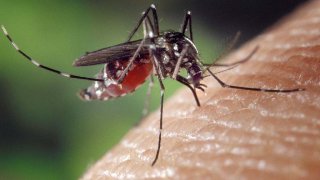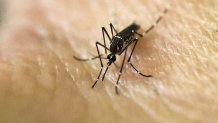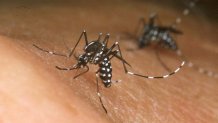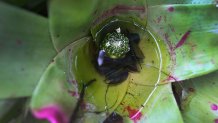
What to Know
- Aedes "ankle-biter" mosquitoes have invaded SoCal.
- They will aggressively bite multiple times in one sitting, and will come out in the middle of the day — atypical SoCal mosquito behavior.
- While native mosquitoes need a large body of water, these can breed in a small bottle-cap of water, and eggs can last up to a year.
It's that time of year again: it's time for barbecuing, basking in the sun, and of course, fending off annoying bites from mosquitoes.
What's worse, in Southern California, is the presence of an aggressive ankle-biter mosquito that will bite multiple times, and doesn't wait for dusk — they'll attack right in the middle of the day, or even inside your house. That's atypical mosquito behavior, at least for the kinds that are native to Southern California.
If you've noticed you've suddenly been bitten multiple times around your ankles, you were likely victim to the Aedes mosquito, which officials believe arrived on a container ship from Asia. It's an invasive species, meaning not native to Southern California, and fueled by bloodlust (basically). And they have the potential to carry harmful diseases, like in the case of one 74-year-old Imperial County man who died after contracting West Nile virus, which was the first person to die of the virus in California in 2019.
The Greater Los Angeles Vector Control recently found a large number of mosquitoes infected with West Nile Virus in Studio City.
What do Aedes mosquitoes look like?
Aedes aegypti (the yellow fever mosquito) and Aedes albopictus (the Asian tiger mosquito) are small black winged creatures with white stripes on their backs and legs, LA County Vector Control said. You may also notice what looks like a long striped tail.


Where have they been biting people?
The relentless Aedes mosquito has been spotted in a host of places — Los Angeles, Orange, Riverside, San Bernardino, San Diego, Tulare, Merced and even more counties, according to the California Department of Public Health.

Local
Get Los Angeles's latest local news on crime, entertainment, weather, schools, COVID, cost of living and more. Here's your go-to source for today's LA news.
Facts
Not all mosquitoes bite. Female mosquitoes feed on your blood because they need it for their eggs. Male mosquitoes feed on flower nectar.
Dogs can get mosquito bites? Yes. When they do, they sometimes can contract heartworms, which can be fatal.
Aedes mosquitoes have the potential to transmit dangerous diseases like dengue, chikungunya, Zika, and yellow fever, however, none of these viruses have been transmitted in California via ankle-biter mosquitoes.
"Native mosquitoes bite at night. These bite in the daytime. While native mosquitoes need a large body of water, these can breed in a small bottle-cap of water," Robert Saviskas, the executive director of LA County West Vector Control told NBCLA in a previous report.
They also lay larva just below the water line.
"Those eggs can last up to a year … and still be viable," Saviskas said.
LA County Vector Control also said a swimming pool can lead to more than 10,000 mosquitoes each week if not treated.
Residents see more mosquitoes as the summer months heat up, with the height of service requests for experts to check peoples' homes in August and September, at least in the greater Los Angeles County vector district. The reason for that also comes from people watering their lawns more frequently in the summer, creating even more water sources for mosquitoes to lay eggs.
Mosquitoes also don't like to travel too far from the standing water source, so if you've got mosquitoes, it's either in your yard, or a neighbors.
Do you have a gorgeous, colorful bromeliad plant? You might want to reconsider. Because of how the water pools on those plants, mosquitoes love them, according to Greater LA County Vector District's Public Information Officer Anais Medina Diaz.

Curious about which animal and insects are natural predators to mosquitoes, such as dragonflies? Read more here.
How to help avoid breeding mosquitoes
Get rid of standing water — at any amount. A mosquito can breed in as little as a capful of water, and can complete their life cycle in a week.
They can breed indoors and outdoors, so make sure you don't have any containers filled with water just sitting around in your house.
Where they can breed: Buckets, plant saucers, old tires, fountains, swimming pools — even your recyclables. Also, don't forget about ground drain boxes.
Buy and use insect repellent.
Look for insect repellent with the following ingredients.
- DEET
- Picaridin
- Oil of Lemon Eucalyptus
- IR3535
Vector Control in your area
Los Angeles
If you've done all you can do and you are still seeing mosquitoes, you can fill out the service request form or call 562-944-9656.
There is a wonderful and natural solution to pesky mosquitoes as well — mosquito fish! A large female mosquito fish can eat up to 100 mosquito larvae per day. They can survive in water temperatures 33 to 104 degrees.
They're best for pools, birdbaths, fountains, and water troughs that are not regularly maintained. You can learn more about them here.
Get your mosquito fish by calling District Headquarters at 562-944-9656 or the Sylmar Branch at 818-364-9589. You can also request them online here.
It's important to note: It is against California Department of Fish and Game regulations for private citizens to plant mosquito fish in waters of the state without a permit, so place them on your property only.
Orange County
If you live in Orange County and have a mosquito problem that hasn't been solved by taking the above tips, fill out the form on the vector control's website here.
Another option is to use mosquito fish (on your property only) to rid water of larvae. Find out how Orange County residents can get them delivered here.
San Bernardino
San Bernardino residents can also get mosquito fish from the county. One request may be made per house per year.
First, determine which jurisdiction your home falls within at this search form. Then, visit the office during business hours at 248 South Sierra Way, Unit E, San Bernardino.
Neglected pools can also create a mosquito habitat. If you have a concern about someone's pool, you can call 1-800-44-ABATE (1-800-442-2283).
Sometimes birds can get bitten by a mosquito and contract West Nile virus. To report a dead bird that died within the last 24 hours, call the California West Nile virus hotline at 1-877-WNV-BIRD (1-877-968-2473).
Riverside
Mosquito fish are also provided to residents free of charge in Riverside County. If you need help with a mosquito problem, fill out the service form here. Residents can call the office for more information at 951-340-9792.
A high number of mosquitoes that tested positive for West Nile Virus were netted in Nuevo, but no spraying plans had been announced. A lot of the mosquito activity has been found in Coachella Valley, authorities say.
Ventura
Contact the Ventura County Vector Control at this number for help with mosquitoes: 805-654-2494. To request free mosquito fish for ponds, fountains, and water gardens, call 805-662-6582.
Santa Barbara
Call Mosquito and Vector Management District of Santa Barbara County for help at 805-969-5050, or fill out an online form here.



